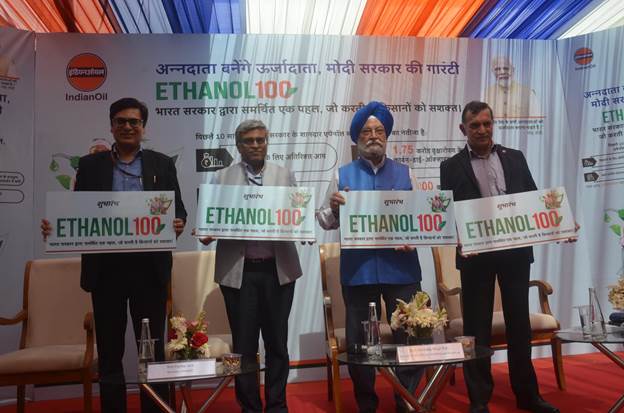.jpg)
Introduction
In a significant stride towards sustainable energy, India marked a pivotal moment with the launch of 'ETHANOL 100' automotive fuel. Spearheaded by the Union Minister for Petroleum & Natural Gas and Housing and Urban Affairs, Shri Hardeep Singh Puri, this initiative aims to reshape the nation's transportation landscape while prioritizing environmental conservation and agricultural empowerment. The launch ceremony, attended by esteemed dignitaries and officials, underscored the government's commitment to reducing fossil fuel dependence and promoting cleaner, greener alternatives.
Key Highlights
Visionary Inspiration: Shri Puri attributed the inception of ETHANOL 100 to the visionary leadership of the Prime Minister, emphasizing the transformational potential of the fuel in transitioning from 'Annadatas to Urjadatas'.
Accelerated Adoption: The Minister highlighted the rapid expansion of E20 (20% ethanol blended fuel) availability, with the launch of ETHANOL 100 marking a significant milestone towards achieving the target of 20% ethanol blending by 2025-26.
Economic and Environmental Benefits: Ethanol blending initiatives over the past decade have not only bolstered farmer incomes and rural employment but also resulted in substantial foreign exchange savings and reduced CO2 emissions, equivalent to planting 1.75 crore trees.
Industry Collaboration: Oil Marketing Companies (OMCs) have played a pivotal role in advancing ethanol blending, with long-term offtake agreements signed with dedicated ethanol plants to augment production capacity.

Expert Perspectives
Shri Pankaj Jain: The Secretary of the Ministry of Petroleum & Natural Gas lauded the transition towards sustainable technologies and commended IndianOil for their commitment to ethanol-based vehicles. He emphasized the significance of consistent ethanol supply and its role in decarbonization efforts.
Shri Shrikant Madhav Vaidya: Chairman of IndianOil, highlighted India's pioneering role in sustainability with the introduction of ETHANOL 100. He underscored the fuel's superior environmental performance and its potential to revolutionize clean mobility.
Conclusion
ETHANOL 100 emerges as a beacon of sustainability, offering a cleaner, greener alternative to traditional gasoline. With its lower emissions, enhanced efficiency, and versatility in vehicle compatibility, ETHANOL 100 stands poised to reshape India's automotive fuel landscape. As the nation progresses towards a future of cleaner energy and reduced environmental impact, the launch of ETHANOL 100 signifies a monumental step forward in realizing these aspirations.